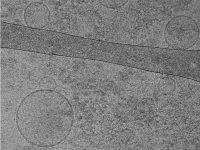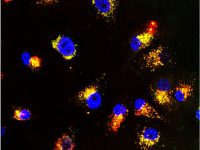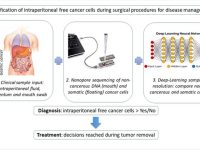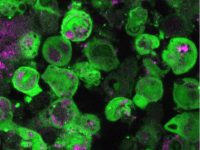Surgical Oncology Research Laboratory
R&D > Laboratories > Surgical Oncology Research Laboratory -Prof Guy Lahat >>

Our Vision
The surgical oncology research lab was established to conduct clinical and basic science research in order to improve diagnosis and treatment outcomes of the patients we operate on. Moreover, the lab is a platform for the development of future academic surgeons, passionate about both research and the field of surgery. We focus on patient-driven translational research, studying the molecular basis of various cancers. We aim to explore distinct signaling pathways and molecules that may play a role in cancer development, progression, metastasis, and response to therapy.
Specifically, We investigate extracellular vesicles- mediated cross talk between metastatic GI cancer cells and the peritoneal microenvironment. For these purposes we frequently utilize in-vitro and in-vivo models, fresh human cancer specimens, as well as various advanced molecular and bioinformatic approaches.

Contact Us
Primary Investigators

Prof. Guy Lahat , Lab PI
Director of Surgery Division;Faculty of Medicine.
Phone: +972-3-6973911
Email: guyla@tlvmc.gov.il

Shelly Loewenstein , Lab manager
Phone: +972-3-6972551
Phone: +972-54-5771044
Email: shellyl@tlvmc.gov.il
Address
Sammy Ofer Heart Building
10th floor
Room 64-65
6 weizmann st., Tel Aviv

Research
The peritoneal cavity, especially the omentum, is a common site for gastric and pancreatic cancer metastasis, representing advanced disease stage and poor prognosis. Extracellular vesicles (EVs) are spherical nanovesicles that are released from almost all living cells and are involved in cell–cell communication. Several running studies aim to characterize the crosstalk between tumor cells and different cells of the peritoneal microenvironment (primary omental adipocytes from lean and obese patients, mesothelial and endothelial cells) mediated by EVs. We focus on the tumorigenic and angiogenic effects of the EVs mediated by different proteins and miRNAs. |
(In collaboration with Dr. Anat Aharon, Head of the hematology research laboratory for extracellular vesicles, Tel-Aviv Sourasky Medical Center).Extracellular vesicles carry biological information from their parental secreting cells. By using plasma samples of cancer patients, we wish to evaluate the potential diagnostic role of circulating tumor derived EVs. The identification of such biomarkers may be utilized for tumor diagnosis and as a follow- up marker for recurrence and response to therapy.
(In collaboration with Prof. Noam Shomron, head of the functional genomics laboratory at the Sackler faculty of medicine in Tel Aviv University). Recurrence and metastasis of intra-abdominal malignancies, such as gastric and pancreatic cancers, is often the result of undetected cancer cell dissemination even when the malignancy has been surgically excised. The current study aims to combine Deep Learning with Nanopore DNA sequencing technology in order to establish an ultra-rapid method for the detection of cancer cells in abdominal fluid during surgical procedures. Such a tool could be used to increase the efficiency of both surgical as well as post-operative treatments, thereby abating the recurrence and metastasis of intra-abdominal cancers.
(In collaboration with Dr. Rami Unterman, Director of Pulmonary Fibrosis Service, Tel-Aviv Sourasky Medical Center). Pancreatic cancer is a common cause of cancer-related mortality; omental spread is frequent and usually represents an ominous event, leading to patient death. Single-cell RNA sequencing (scRNA-seq) facilitates the whole-transcriptome characterization of individual cells in highly heterogenic tissues, including tumors. In this project we aim to investigate EVs enriched with miR-141 as therapeutic nanoparticles for pancreatic cancer in vitro, in vivo and in patient-resected metastases ex vivo. We will leverage on the high-throughput power of scRNA-seq to deeply profile miR-141-enriched EVs effects on pancreatic cancer metastases and their microenvironment, using patient-resected omental metastases samples.
(In collaboration with Prof. Ronit Satchi-Fainaro, head of the cancer research and Nanomedicine laboratory at the Sackler faculty of medicine in Tel Aviv University and Dr. Anat Globerson-Levin, Head of immunology and advanced CAR-T therapy laboratory, Tel-Aviv Sourasky Medical Center). Pancreatic cancer is a common cause of cancer-related mortality; peritoneal spread is frequent and usually represents an ominous event leading to patient death. Chimeric antigen receptor T (CAR-T) cells are genetically engineered T cells directed against a tumor associated antigen. CAR-T cells have given rise to innovative breakthroughs in the treatment of hematological malignancies, however, their success in treating solid tumors has been limited. In this study we aim to develop combined therapy using CAR-T cells, anti-angiogenic nano-carriers and mesothelial cells EVs for the treatment of pancreatic cancer by using an innovative 3-D spheroid model which simulates the tumor microenvironment. |
Gallery



Our Team
Current Staff
Researchers
- Prof. Guy Lahat (MD)
- Dr. Shelly Loewenstein (PhD)
Students:
- Adi Rubin (Msc)
- Donia Seh (Msc)
- Stav Leibou (MD student)
- Hannah Sherman (MD student)
- Alison Siegel (MD student)
Madaei Yesod:
- Lior Orbach
Rom Students:
- Hen Geller
Past Staff
Students:
- Olga Kersy (Msc)
- Valerya Feygenzon (Msc)
- Omri Rachmimov (MD student)
Madaei Yesod:
- Michal Shimonovitz-Moore
- Fabian Gerstenhaber
Rom Students:
- Lir Gafny
- Talya Kalfon
- Yarden Weiss
Current funding





Highlighted Publications
Gastric Cancer Derived Extracellular Vesicles (EVs) Promote Angiogenesis via Angiopoietin-2
|
Micro-RNA Expression Patterns Predict Metastatic Spread in Solid Pseudopapillary Neoplasms of the Pancreas.
|
Omental Tissue-Mediated Tumorigenesis of Gastric Cancer Peritoneal Metastases. Kersy O, Loewenstein S, Lubezky N, Sher O, Simon NB, Klausner JM, Lahat G. Front Oncol. 2019 Nov 18;9:1267. |
More Publications >>
Margalit S, Avraham S, Shahal T, Michaeli Y, Gilat N, Magod P, Caspi M, Loewenstein S, Lahat G, Friedmann-Morvinski D, Kariv R, Rosin-Arbesfeld R, Zirkin S, Ebenstein Y. Int J Cancer. 2020 Jan 1;146(1):115-122.
Lemberger M, Loewenstein S, Lubezky N, Nizri E, Pasmanik-Chor M, Barazovsky E, Klausner JM, Lahat G. Oncotarget. 2019 Apr 5;10(27):2644-2656.
Unique cellular interactions between pancreatic cancer cells and the omentum.
Feygenzon V, Loewenstein S, Lubezky N, Pasmanic-Chor M, Sher O, Klausner JM, Lahat G. PLoS One. 2017 Jun 20;12(6):e0179862.
Loewenstein S, Lubezky N, Nizri E, Zemel M, Levin Y, Savidor A, Sher O, Klausner JM, Lahat G. Mol Cancer Res. 2016 Dec;14(12):1254-1265.
Lahat G, Lubezky N, Loewenstein S, Nizri E, Gan S, Pasmanik-Chor M, Hayman L, Barazowsky E, Ben-Haim M, Klausner JM. Ann Surg Oncol. 2014 Dec;21 Suppl 4:S750-7.
MicroRNA expression signatures in intraductal papillary mucinous neoplasm of the pancreas.
Lubezky N, Loewenstein S, Ben-Haim M, Brazowski E, Marmor S, Pasmanik-Chor M, Oron-Karni V, Rechavi G, Klausner JM, Lahat G. Surgery. 2013 May;153(5):663-72.











